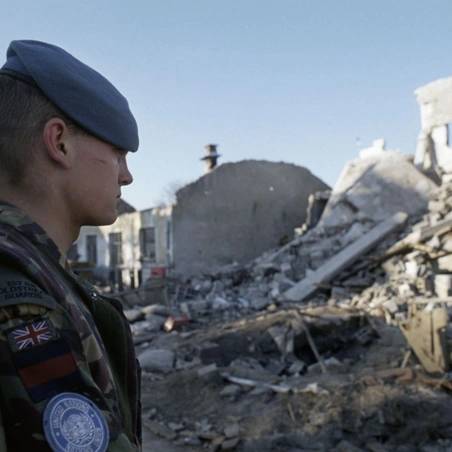There was never any doubt that Warren would join the army. He came from a Wigan military family with generations of service: “I knew all the way through school that it was my goal.”
Warren joined up in 1990, still a teenager. He was serving in the Queen’s Lancashire Regiment when it was deployed as part of the UN force in Bosnia in May 1993. This was to be a challenging tour.
“Bosnia was a difficult conflict, they were trying to starve people out, there was ethnic cleansing, there were concentration camps, it had echoes of WW2, so our aim was to escort aid convoys.”
At first based in Vitez in an old school, and then in the north of the country, the regiment’s role was to accompany trucks of food and aid to isolated villages as well as to monitor the situation. They faced challenging situations, such as being held for hours at checkpoints by Serb soldiers and finding that mines had been laid under the trucks.

Under Fire
On another occasion, his Warrior armoured vehicle came under tank fire while in a remote valley. After battening down, and being exposed for several minutes, they drove away fast across open ground. Warren could hear, and feel, the shells exploding close by and even hitting the sides of the Warrior.
British and other UN troops were witness to many things they couldn’t prevent. “I saw burnt bodies, pregnant women tortured and tied to trees, whole villages massacred, including children. We would stay in these ravaged villages overnight with the sights and smells until the investigators arrived.”
The Rules of Engagement for UN soldiers was limited, and the trauma affected many, including Warren. “When you’re there, you just react, you get fired upon and you witness ethnic cleansing, but afterwards it hits you. As soon as I returned to base in Germany the mental health issues started and remained undiagnosed for years.”

Warren’s Journey
Back in the UK on leave, Warren would lock himself away in his parent’s house in Littlehampton. Things were no better when he returned to his regiment. “…things just got worse, and I didn’t know what was wrong with me. The army told me to keep ‘soldiering on’ and put me on light duties, away from any weaponry.”
Counsellors and psychiatrists were unable to help Warren, and he entered a downward spiral which culminated in attempted suicide. He was mis-diagnosed with a personality disorder.
In June 1995 Warren was discharged as ‘Services No Longer Required’ rather than on a medical discharge, which meant he and his wife lost their accommodation. He became more withdrawn, but one day read an article on ‘Gulf War Syndrome’ that set him on a journey to find forces psychiatrist Dr David Jones, who held clinics at local RBL clubs. Dr Jones diagnosed Warren with PTSD in his mid 20s. It was the start of his recovery.
It took 16 years for the MOD to recognize and compensate his experiences. He continues to live with PTSD: “it never really goes away… but the symptoms are much less.”

Battling Back
Ten years ago, Warren and his family were supported in finding a home by Haig Housing. The RBL also helped with kitchen equipment. “It was a massive help the week we moved in – since then, the RBL have always been there for us.”
A course for veterans at the RBL’s Battle Back Centre has helped to consolidate his confidence. “…it was an incredible week and since then I’ve been tapping into my old self. I have been so lost, the stuff I did when I was younger, prior to Bosnia, I had lost all of that due to my trauma, but now I’m in a much better place, thanks to the RBL.”
After decades, Warren feels able to look at his military photos and medals. “I mounted them on the wall last year after returning from the Battle Back course. It’s taken me 30 years to put those pictures back on the wall, because healing takes time, but my pride is back now.”
Bosnia took its toll on many Armed Forces personnel. “It's still raw, and a few of the lads on those pictures have killed themselves. I had a lucky escape myself, of course, so Remembrance is very important to me, to remember those lads, not just in November, but every day.”
Warren attended the special RBL ceremony to pay tribute to the men and women who served in Bosnia in December 2025, and was one of the first to hang a votive light in memory of their service.
This year Warren was able to fly for the first time in 30 years. After the incident in the Warrior vehicle under tank fire he actively avoided enclosed spaces, but his PTSD treatment has begun to free him. Today Warren is focussing on training for RBL’s Pedal to Paris in 2026 and the trials for the Invictus Games in Birmingham in 2027.






